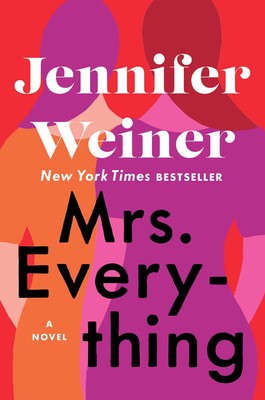August 5, 2019
Keeping Blogging Weird
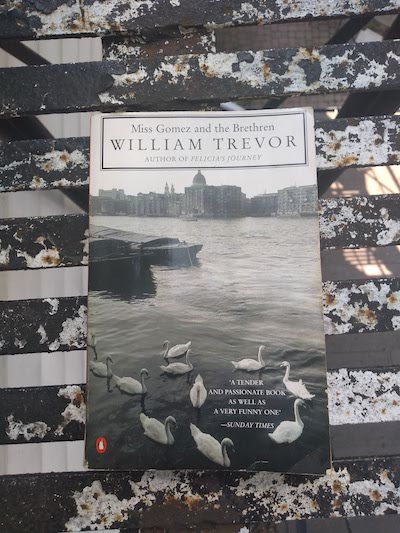
In the spring, @hkpmcgregor recorded an episode of Secret Feminist Agenda about “Keep Podcasting Weird,” and I’ve thought about the episode a lot in relation to blogging and book blogging. I had been blogging about books for awhile when publishers started sending me review copies in 2007ish, and while I was grateful for their attention and consideration, I lament now what it did to my blog. Because it turned my blog into a blog that looked like everyone else’s, and at the time I even thought that meant I was finally doing it right. But what gets lost—attention to obscure novels, my own unique perspective, the indulgence of my own curious avenues. It’s also just not as interesting to be blogging about exactly the same books that everyone else is, and what exactly is the point of this pursuit, beyond contributing to online homogenization.
I’d started blogging about books while I was a graduate student, so I’d been writing about Virginia Woolf and Victorian entomologists, and I was obsessed with the works of Margaret Drabble and Laurie Colwin…and then all of sudden here I was reviewing the new Ian McEwan. Yawn.
From my new online blogging course, Find Your Blogging Spark
More than ten years on, I’ve learned the virtues of keeping it weird, who wins when we do (hint: it’s everyone), and what a more interesting place is the blogosphere and #bookstagram when we make space for novels purchased for a dime at a provincial park camp store. Books you decide to spend that dime on because of a description that begins with, “Only the pub and the pet shop are still inhabited in the boarded-up wasteland of Crow Street Southwest London…”
I spent much of this long weekend reading Miss Gomez and the Brethren, an early novel by William Trevor, whom I’ve never read before, and the novel reminded me of Muriel Spark, that curious midcentury mix of slightly old fashioned and shockingly sly and subversive at once, with an outsider’s view of Englishness.
I absolutely loved it, and have been thinking a lot about serendipity, partly because the book is about just that (although in a darker and less whimsical sense) and also because of the odds of this book and I finding each other, the most perfect literary match. Whoever left this book—which I’d never even heard of—in the camp store so that I would find it because we’d ducked in to get out of a thunderstorm, lingering over ice cream cones to avoid going out into the rain. Someone left it and I happened to find it, picking it up because William Trevor’s on my long list of authors I’ve been meaning to get around to reading, and here was one of his books in my hands, the kind of summer reading magic that is impossible to manufacture, but I’ve been grateful to be a beneficiary, and have this book be part of a wonderful long weekend.
August 2, 2019
Mrs. Everything, by Jennifer Weiner
I had an oddly optimistic revelation about the world the other day—odd, because I haven’t had an optimistic revelation about the world for at least four years—which was that when people look back on the literature published in the second half of this decade, they’re going to be thinking, “Good gracious, the Patriarchy (RIP) on its last legs must have been quaking in its ugly boots.”
Because the books are so feminist, and furious, confronting racism and violence against women. Fiction and nonfiction, commercial and literary—I promise I haven’t been even deliberately seeking them out. But almost every book I’ve picked up this year, and certainly every one that I have loved, has been staring the patriarchy in the face and having none of it. Refusing to submit, to be polite, to keep things uncomplicated, to tolerate the status quo.
And in 25 years—after the current US president has been found dead on a toilet, the stupid red hats have disintegrated (cheap production will do that), and a few remaining rat-men have built an all-male colony out in the ocean on an island constructed from millions of copies of 12 Rules For Life (I would LOVE to know the number of people who bought that book versus number of people who finished it; is that why it keeps selling? Because the reader hopes a different copy might prove worthy of their attention?)—these books will be what remains of this time, the culture we made.
It’s sort of like the illusion I once bought as a young person that the 1960s was only groovy and folk songs, instead of political assassinations, endless war, and racial violence. You know the expression, “You had to be there.” In this case, it’s kind of the opposite. It’s even better if you weren’t.
And this is the gist of Jennifer Weiner’s latest novel Mrs. Everything, her thirteenth novel and her tour de force, a novel that reminded me of recent work by Meg Wolitzer and Lauren Groff. My one criticism that it started out unsteady, the story of a family in the 1950s whose American Dream is coming true, a mother and father and two daughters who’ve just moved into red brick house in Detroit. The characters are a bit stock at this point, the good girl and the bad girl, their disapproving mother, some manufactured drama…but then the novel starts going and it never stops.
What I love best about this novel is what I love best about any narrative that features more than one woman (which is the only kind of narrative I love at all, to be honest). That the women in the book are not foils, that their characters and narrative development is sufficiently complicated, and that their relationship is as much supportive as it is fraught. And such is the way with Jo and Bethie Kauffman, the two sisters who grow up in that house in Detroit. One is posed to be the good girl and the other is the problem, and then fate intervenes and neither one ends up on the trajectory that she, the reader, or anyone else imagines for her. Jo will become a suburban housewife, Bethie the counterculture rebel, but neither archetype is the whole story, and the whole story is mostly that there is no right way to be a woman. We live in a society that’s going to mess with each and every one of us.
The novel takes the sisters from the 1950s through to the present day, and beyond, and its fabulous momentum builds as it goes. The sisters come together, are pulled apart, face heartbreak and trauma, keep going, keep learning and growing wiser all the time. This is a story of women, and civil rights, and the rise of LGBTQ rights as well.
The constants? Weight. It’s not a theme of the book, but it’s always in the background, as its always in the background (maybe not so far back) of the lives of almost every women I know. Feeling fat when you’re not, and then actually being fat—is it not remarkable that women are able to feel badly about themselves no matter what their size? It’s a fascinating narrative strand in the book. As is the idea of mothers wanting something different and better for their daughters than what they themselves have had to go through, but the thing about daughters (who are women, who are people) is that they don’t always want to dream the dreams their parents dream for them, and they have to learn from their own mistakes, and also none of us want to entirely believe that we’ll be subject to the same rules our mothers were. We’ll do it different, this time, and we do, but some things stay the same, as Mrs. Everything serves to underline.
As Michele Landsberg explains in her book Writing the Revolution: “Because our history is constantly overwritten and blanked out…., we are always reinventing the wheel when we fight for equality.”
But I would like to believe there is something different about the current moment we’re in, when women are finally courageous enough to call out discrimination, abuse and violence, to finally call things by their names. Because in not being able to do so before, were we blanking out our own history, our own experiences? Doing the work of the Patriarchy for it, but no longer. I hope.
Mrs. Everything misses absolutely nothing.
July 31, 2019
Stop Waffling, and Write

I finally read Brigid Schulte’s essay in The Guardian, “What is women’s greatest enemy? Lack of time for themselves,” an essay I’d seen many people sharing online last week. And to be honest, once I got to it, I found the piece a bit…slight? Understanding why it had resonated with so many women for sure, but it also frustrated me, and made me impatient. I wanted more. I wanted something less waffley (no offence to waffles) and less cribbed from A Room of One’s Own, because it’s been 90 years, and surely we can do better than, “What would happen if…” and thought experiments about Shakespeare’s sister.
(What might you have written had you not sat down to write the piece about how women don’t take enough time to sit down and write?)
I’ve spent the last few weeks completing the modules of my blogging course, whose goal is to deliver women the confidence (the nerve?) to carve out their own little space online, to emphasize to them that their voices matter and so do their stories, and that the world needs both these things. I’ve written 25,000 words that I’m proud of and excited to share very soon that I hope will inspire and motivate people who are blog-curious or at least need a little jolt to get their blogging spark back…but at the heart of it all there really is just one point, and it’s this one: You just have to do it.
And you know what? We can blame the patriarchy. (We definitely SHOULD blame the patriarchy. See Toi Smith: ‘Let’s stop calling it “mom guilt” because that’s bullshit and not actually a thing. Let’s start calling it what it really is: internalized patriarchy, capitalism, and white supremacy which has conditioned women to believe that once we become a mother our pleasure isn’t ours, that our joy isn’t ours, that our creative force isn’t ours, and that our time isn’t ours.”)
But all this means is that when you finally do sit down to write, what you’re doing is more radical, awesome and profound than you might initially understand it to be—which only makes it all the more important that you actually sit down and write. Telling yourself that you’re not writing because you don’t take time for yourself is a decision you have made, and it’s kind of boring. It’s also like telling yourself that don’t write because you’re a perfectionist, or that you don’t write because you have a job, or because you have kids. (To be fair, if you’re not writing because you have kids AND a job, I get it. Though there comes a point when “having kids” stops being an occupation that takes up every ounce of your soul and your life.)
Because there are so many people who face these hurdles, but leap over them and write anyway. There are so many women who do make time for themselves and for their art, even if we live in a society that conspires to make them feel guilty about those choices. So to stare wistfully into our teacups and lament the choices we’ve made to limit our creative experiences (honestly, you could let that call from your mechanic go to voicemail) because that’s just how it for women, it’s what we do, is essentialist and very annoying.
It’s also just another excuse to avoid doing the thing, and Brigid Schulte gets it exactly right when she writes, “I wonder if that searing middle-of-the-night pain that, at times, settles like dread around my solar plexus may not only be because there’s so little unbroken time to tell my own untold stories, but because I’m afraid that what may be coiled inside may not be worth paying attention to anyway. Perhaps that’s what I don’t want to face in that dusky room I dream of.”
The biggest challenge lies in not finding the time to write, but in staring such fear in the face. But it’s possible. With the knowledge that even if you fail, you’ll be so much further along than you would have been if you hadn’t tried, and also that you will never ever be better than you’ll be if you start practicing right now.
July 25, 2019
Find Your Next Perfect Summer Read

I made a brand new literary quiz to help you find your next perfect summer read! The results will be a bit familiar if you’re a frequent reader here on the blog, but this will help you decide which one to read first. You can take this quiz here!
July 24, 2019
Even Weirder Than Before, by Susie Taylor

There is a sweep to Susie Taylor’s debut novel, Even Weirder Than Before, each scene written in the present tense and turning into the other so seamlessly. Daisy Radcliffe—our protagonist, who we meet in her thirteenth year at precisely the moment that her father has left their family to take up with one of his graduate students—is never in transit, but rather Taylor has her narrative move from scene to scene and with such smoothness, like a film reel. Like the way that adolescence goes, I suppose, one life changing moment leading right into another without a great deal of forethought.
I really loved this book, which takes Daisy through her teen years, first kisses and first boyfriends, trying to find herself while her family has broken down, and the ebb and flow of friendship. Adolescence is a terrain that many authors have mined before, but Taylor’s approach is fresh and interesting, and all her characters are delivered complexity where lesser authors might have served up tropes (ie the depressed divorced middle aged woman; the deadbeat boyfriend). It doesn’t have quite the same level of absurdity, but Taylor’s narrative recalled Sue Townsend’s Adrian Mole Diaries for me, and also Brian Francis’s debut novel Fruit, both books light on the surface but rich with subtext, which Even Weirder Than Before is exactly.
It’s a queer coming-of-age novel, but its politics is a trick up its sleeve, the very best move saved until the novel’s final sentence. But in the pages before it, we see Daisy learning about her own power as a woman and lack of it, how her mother is messed by the patriarchy, and how the characters in the book, male and female both, respond to the shootings at Montreal’s Ecole Polytechnique, a tragedy that doesn’t appear to touch Daisy’s world directly, and she’ll be older before she really understands. With a subtle hand, Taylor has written a political book that’s also at home in its bright and appealing pink cover—and it’s absolutely a joy to behold.
July 23, 2019
My Favourite Podcasts
Honestly, it seems a bit perfect that a week after the New York Times publishes their “Have We Hit Peak Podcast?” article, I’d write a post about my favourite pods. After all, I’m publishing my post on a blog (from the article, “Like the blogs of yore, podcasts — with their combination of sleek high tech and cozy, retro low — are today’s de rigueur medium, seemingly adopted by every entrepreneur, freelancer, self-proclaimed marketing guru and even corporation”), a form that’s been pronounced dead so often on a regular basis for at least a decade that I kind of feel like an internet zombie as I type this.
Being timely is not my forte. Last week I joined the Patreon of one of my very favourite podcasts…just as the last episode of the season wrapped and they all went on hiatus. So maybe if Kerry Clare is rounding up a list of her favourite podcasts, we’ve hit peak podcast definitively. But on the off chance I’m not the only one who’s late to the party, I wanted to share links to the ones that I’ve been loving.
Even better, most are on a summer hiatus, so here’s your chance to get caught up!
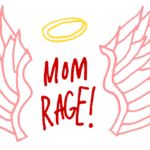
I was referred to the Mom Rage Podcast by my pal Lindsay Zeir-Vogel (notably: a frequent caller to their Labia Hotline) and knew nothing about the podcast before I listened—I think it was the episode where they interviewed a mother who had an abortion. It was good BUT I will admit that I’d underestimated what the podcast was all about. Two blonde white ladies who live in California, I was thinking, shallow and light. But then: NO! I started listening more and realized the hosts (blonde hair notwithstanding) were both writers (Edan Lepucki and Amelia Morris), that they interrogate issue like race, sexuality, public schools and climate change, they’re both absolutely charming, funny and real, and suddenly I wanted to be their best friends. Notably, I’ve been reading books recommended on their podcast all spring—it’s all so good and interesting.

David Tennant Does a Podcast With…
Someone shared a link to this one on Twitter, and it was the episode where Tennant was interviewing Jon Hamm, which was totally weird for me because here were the two men from TV I’ve most fancied (Broadchurch and Mad Men) and they’re talking to each other. And then I listened to previous guests, including his Broadchurch co-stars Olivia Colman and Jodie Whittaker, and every instalment was just interesting and delightful, even the conversations with people I hadn’t supposed I cared about.
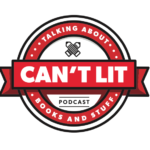
I think Can’t Lit was the first podcast I started listening to, and it’s been a fun and refreshing antidote to the fraughtness of so many literary conversations about community these days. Co-hosts Dina Del Buchhia and Jen Sookfong Lee deliver a generous and bullshit free approach to being readers, writers, and community members, and their conversations with Canadian writers are always genuinely interesting.

To listen to World of Stories, co-hosted by Margrit Talpalaru and Hudson Lin, is eavesdrop on two friends tackling that age-old question, “Whatcha been reading lately?” with a focus on diversity and representation. It’s a pleasure.

Another LZV recommendation (that woman’s one hell of an influencer, at least when it comes to me!), I’ve been listening avidly to Amanda Laird’s Heavy Flow podcast since the beginning of the year, and it’s taught me so much about feminism, periods, and the no-longer-mysteries of my own body. (I also reviewed Amanda’s book of the same name back in March.)

Can a podcast be an academic project? This one can, and it’s even peer reviewed, which is fascinating. And it also means that not everything on Hannah McGregor’s podcast is RIGHT up my street, but so much of it is, and her ideas about academia are applicable to other parts of life. I’ve learned a lot from this one, and really admire McGregor’s persistence and desire to learn and grown through her work.
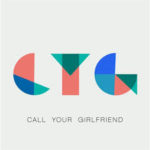
Call Your Girlfriend and Going Through it
And…the podcasts that I am definitely so late to the party in recommending. I really like Call Your Girlfriend, co-hosted by Aminatou Sow and Ann Friedman (“We believe that friendship—particularly among women and femme-identified people—is a defining, important, and powerful relationship, and that conversations among friends can be the source of incredible social and political power”) and also the mini-podcast Going Through It, which Friedman made with Mailchimp. Good storytelling all around.
July 19, 2019
Your Life is Mine, by Nathan Ripley

In two days, I tore through Your Life is Mine, Nathan Ripley’s second novel, (his debut was Find You in the Dark), a book that got richer and deeper as its complex plot progressed. And isn’t that rare? A thriller whose meaning intensifies as the reader gets closer to the resolution?
I loved it.
The protagonist is Blanche Potter, a documentary filmmaker who’s just beginning to enjoy some success with a true crime feature, but she just can’t escape the notorious true crime in her own history, no matter than it was years before and she’s changed her name, and no one (except her best friend Jaya) knows who Blanche really is. That she’s actually the daughter of cult leader Chuck Varner who died after a killing spree that Blanche was witness to as a young child. And Blanche would not be surprised if her father still has followers out in the world intent on carrying on his violent mission, because she knows from experience—she herself spent much of her life under by his spell.
Which is why the news of her mother’s murder delivers Blanche some relief at first—one less tie to Chuck Varner, because Blanche’s mother had never shed her devotion to the man or his message, and getting over having two such messed up parents has been the goal of Blanche’s adult life. She even appears to be succeeding at it…except the news of her mother’s death has been delivered via an aspiring writer who knows too much and wants Blanche to share her story. And he also reports that Blanche’s mother’s murder was a random act, but Blanche knows there’s never been anything random about her tortured family life.
And so she returns to the scene of the crime, which is also the scene of her childhood, to find out who really killed her mother, and if the killer is likely to strike again. But is the whole thing a trap? It’s hard to tell who can be trusted, least of all Blanche herself who has buried years of trauma which is now returning to the surface, threatening to upset the careful arrangement of her present, and she could even end up dead.
The narrative moves between Blanche’s perspective, excerpts from a true crime book about her father’s legacy, and other secondary characters whose roles in the story take a while to become clear. There’s also a dodgy police officer, the sketchy guy who runs the trailer park where Blanche’s mother lived, and the aspiring writer—what are their connections to Chuck Varner? Is Blanche just being paranoid? And what is the most terrible part of her story, the part she has not yet told to anyone?
The novel begins with a broad canvas, but the story gets narrower and narrower as it gets closer to the climax, and doesn’t rely on all the usual tropes for this to work. One of my favourite characters in the book was the utterly effective police officer who comes equipped with a dose of humility, and actually listens to the protagonist—have we ever seen him in fiction before? And underlying the impressively crafted plots are all kinds of ideas about race and class, and gun control, cultism, misogyny and more. The story never stops being interesting, even as the pages are flying along.
July 18, 2019
A House Like A Lotus, by Madeleine L’Engle
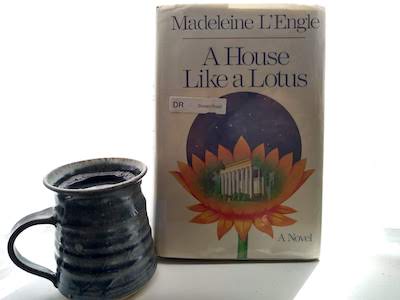
Now here’s a shining lesson on why you should probably write down your thoughts about things and not rely on your brain to remember, because I read the next book in Madeleine L’Engle’s Polly O’Keefe series the week before our vacation, and now I can no longer recall my salient thoughts about the novel, which has since been returned to the library. Though I cannot wholly blame this predicament on my poor brain, because part of the problem is that this novel is blending together with the Austin series into a kind of primordial L’Engle soup. Precocious heroine who is misunderstood and feels she fails to measure up in comparison to her siblings (and, in this case, her impressive cousin Kate); air travel to a foreign destination (Greece!); and she even runs to Zachary Grey (ugh) though it is to Polly’s credit that she’s far less taken with him than Vicky Austin had been.
Partly because Polly has other things on her mind—she is flying to Greece because of an opportunity arrived at by arrangement of her mentor, an older woman who has betrayed Polly in a serious way. What exactly Max has done to Polly is not made entirely clear in the text (Mari Ness, whose reviews of these books I’ve so appreciated as I’ve read them myself, suggests that Max, a lesbian, has made sexual advances to Polly, but I thought the situation was more than Max was ragingly drunk and turned into a bit of a monster, which was really upsetting for Polly to see—she’s only sixteen—because Max was someone she really admired and respected) and the novel moves between Polly’s present situation en-route to and in Greece, and then to her reflections on her relationship with Max, the way it unfolded and fell apart.
Zachary Grey was useful in this book for once (although it true Zachary Grey style, he takes Polly on a reckless adventure and then nearly kills her due to his selfishness and impetuosity) because Polly realizes the way in which she permits this (supposedly) charismatic and exciting young man in her life to be complicated and problematic, but does not offer the same latitude in her considerations of Max and others.
It was also illuminating to read a bit more about Meg Murry O’Keefe, firmly ensconced in her domestic role, who explains at one point that she has arranged her life as such because she felt neglected as a child by her own mother’s career focus and wanted her children to have a different experience. (And now I’m imagining a terrific story underlying this, though I expect it was not L’Engle’s intent, but imagine if you’d had the adventures Meg Murry had in the Wrinkle in Time series? How would you raise your children understanding that the universe is so expansive, strange and dangerous, and that one of your precious babies might tesser into another dimension at any time??? Could that turn you unto something of a helicopter mom? [Although Polly’s parents certainly do permit free rein, as demonstrated by the adventures Polly has got up to so far in the series…] Also, once you’ve been to the limits of space and time, might you consider a career on earth overrated? Would Meg Murry not find all these considerations, actually, a little boring?)
Anyway, I liked this book, though it did not rock my socks and I kind of skimmed the parts once Polly arrives at the retreat where she’s been assigned to make beds for days and days. One more Polly book before me—An Acceptable Time, which I had as a child but never finished—so this whole thing is kind of full circle.
July 16, 2019
Summer Reads
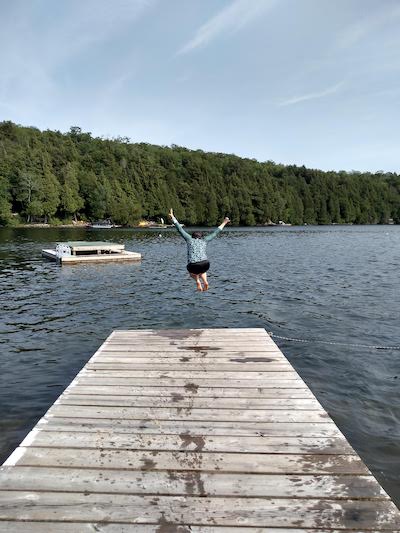
Last week was splendid, all the time in the world for swimming, reading, fun with friends, and board games, and chips and butter tarts. We couldn’t have asked for better weather or company, and it was wonderful to return to this lovely lakeside spot that we’ve been enjoying for the past four years and to be reunited with some of our favourite people. Of course, what most distinguishes a perfect holiday for me is that I got all the books read.
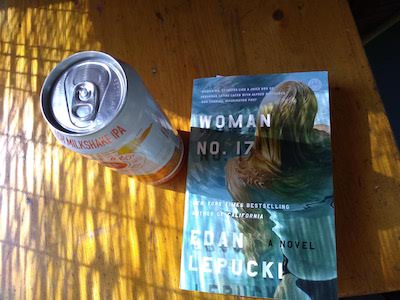
My first book was Woman No. 17, by Edan Lepucki, co-host of the Mom Rage Podcast, which I’ve become obsessed with in the last few months. And it was really good, so different, California-lit that put me in mind of Joan Didion or Rachel Kushner. Fucked-up women and what it means to be an artist, and examining motherhood from a fascinating angle—I was really interested in reading how the novel fed into Lepucki’s other projects (both the podcast and also Mothers Before). It was moody and atmospheric, and incredibly interesting. I loved it.
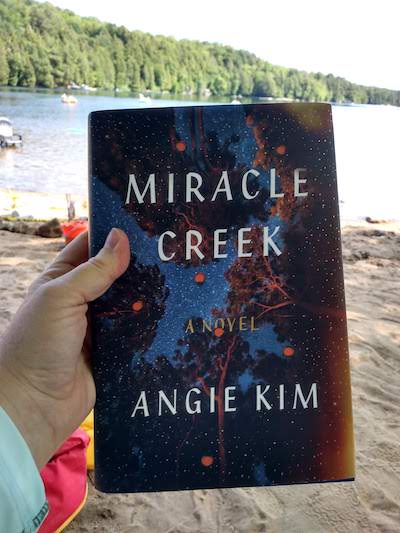
Next up was Miracle Creek, by Angie Kim, a courtroom drama by a lawyer-turned-novelist. An oxygen chamber—designed to treat such things as autism symptoms and infertility—explodes, and two people are dead, and everybody has a secret to hide. Did the mother of a young boy with autism kill her son intentionally? The machine’s owner, a recent immigrant from Korea, is not telling the whole truth either, and the novel is pretty riveting as all the pieces come together. Another book, like Lepucki’s, about motherhood and its demands on those whose children have special needs. Plot-wise, the book is excellent, although I yearned for a bit more subtlety (the last chapter is way too explainy) but I like my summer reading with a hook, so this was fine.
*
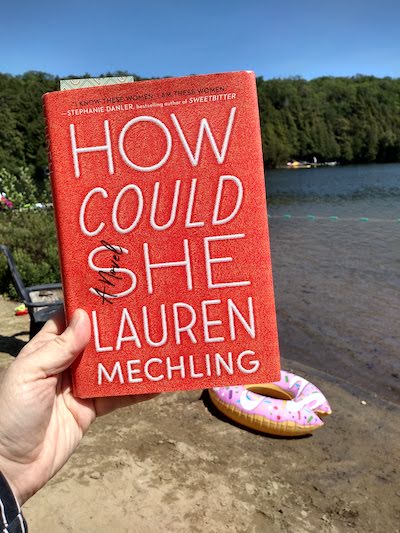
I read about How Could She, by Lauren Mechling, in Vanity Fair, which has far too little books coverage in it lately for my liking, and here was a book about female friendship that was partly set in Toronto, so I was most intrigued. It’s about a woman in her late 30s who wants to kickstart her life by moving to Manhattan, where two good friends—one an artist it-girl and the other a new mother—are well established in their lives. On the surface, the book seems light and frothy and somewhat untidy as a narrative, plus there were too many details about Toronto that were all wrong (such as, tragically, we don’t have a Shake Shack), but the whole thing came together really satisfyingly for me, and Mechling really finely articulated the weird and prickly nuance of friendship and its dynamics.
*
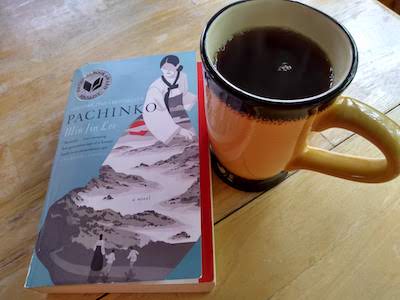
I’ve been meaning to read Pachinko for ages, and I’m perhaps the last human being on earth to get around to it. I’ve never heard anything but massive praise for this novel, a sweeping historical narrative about Koreans in Japan. And perhaps I’d been putting it off and putting it off because “sweeping historical narratives” are just not my thing, but I am glad I finally read this one, a five hundred page novel I read in a day. It was compelling in itself, but extra for me because I used to live in Japan and know that the historic prejudice against Koreans is not only historic. And it was fascinating to have a window about Japanese history that I haven’t seen before. It was an emotional and really interesting read.
*
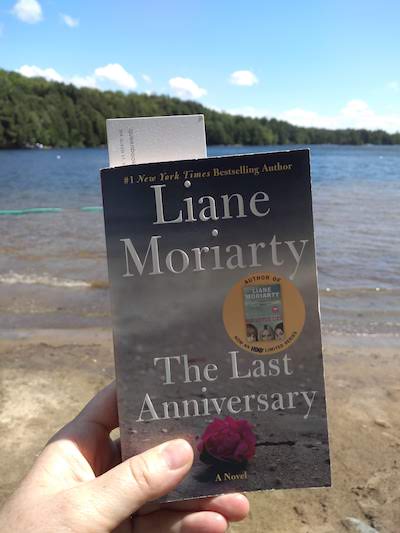
The opposite of a sweeping historical narrative is Liane Moriarty’s The Last Anniversary, which was a little bit stupid, but it was her second novel and I bought it for $8 at the drug store, so what was I expecting? It was terrific fun—family secrets, maybe murder, so much humour, and a map at the beginning!—and came together in such a smart way that foreshadows Moriarty’s eventual strength as a novelist. I also just really love mass market paperbacks and that you can buy novels at the drug store.
*
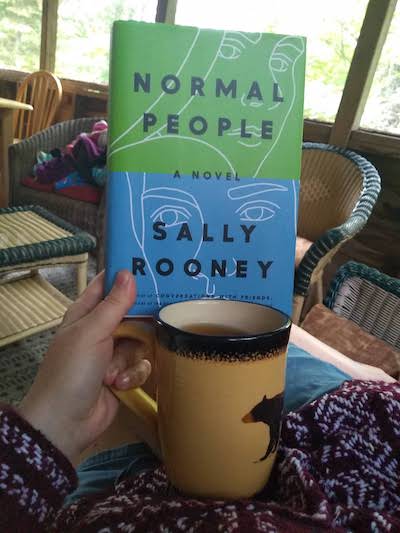
Not stupid at all was Sally Rooney’s second novel, Normal People, a novel whose hype was so amped that I almost resented buying the book, as though I didn’t have a choice in the matter. I’d read Conversations With Friends and liked it well enough, but had been led to expect way more from it than it actually delivered (and I thought it was kind of annoying). I bought Normal People after hearing Sally Rooney on the radio, and in hardcover even, but it was worth every penny. About a mismatched relationship between an outcast girl from a wealthy family and the popular boy whose mother is their cleaner, and what they find in each other and what they take from each other, and the dynamic is never static. Nothing is in this coming-of-age tale of love and friendship, a sad and beautiful heartbreaking story that was both familiar and strange at once. It was everything they said it would be.
*
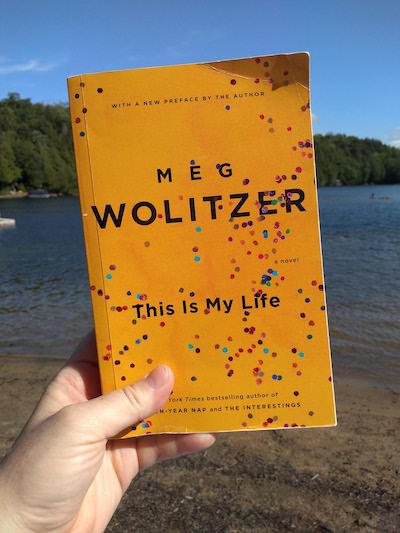
I read Normal People in a morning on our last day, when it was cool and grey and all I wanted to do was wear sweaters and read on the porch, but then the sun came out and we went back to the beach, and I got to dig in to This is My Life, from Meg Wolitzer’s back catalogue, which I bought at Books Are Magic in Brooklyn in May. And it was a really wonderful book. Flawed as a novel, as Wolitzer admits in her preface to this 2013 edition, but there were paragraphs in it that made me gasp with recognition, so perfectly articulated. It’s interesting to see what Wolitzer was up to so close to the beginning of her career, and I really loved this one. Definitely worth a read (and it was made into a movie in 1992, Nora Ephron’s directorial debut, although it looks like the movie version of the story was very different).
July 15, 2019
Gleanings: Special Summer Edition

- “I had this tremendous urge to see giraffes roaming free.”
- “I want to say that I think selfies are potentially beautiful and ridiculous and fun and ultimately sublime attempts to capture your own soul when others have perhaps failed.”
- I want readers to understand that women are highly complicated and complex individuals — and that humans are very contradictory.
- That morning, Georgia found out that I was the tooth fairy.
- How like motherhood to occupy the margins, even while the image depends on you, depends on the hand you firmly hold against the force of a door that wants to close.
- What is a photograph of an ordinary person? That’s my question.
- I am definitely a sucker for a well-designed and beautiful book cover and this one might be the most beautiful I’ve ever seen.
- Begin with humility, I told the group in my workshop. Your ignorance is an uncovered manhole and if you’re not careful, you’ll topple in.
- One day, my baby will wear an enormous tutu and dance around the kitchen to Blondie.
